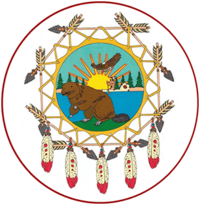Beaver First Nation facts for kids
 |
|
| People | Dane-zaa |
|---|---|
| Treaty | Treaty 8 of 1899 |
| Headquarters | Boyer River |
| Province | Alberta |
| Land | |
| Main reserve | Boyer 164 |
| Other reserve(s) | |
| Land area | 70.75 km2 |
| Population (2019) | |
| On reserve | 449 |
| On other land | 38 |
| Off reserve | 660 |
| Total population | 1147 |
| Government | |
| Chief | Gary Kipling |
| Council size | 4 |
| Tribal Council | |
| North Peace Tribal Council | |
| Website | |
| beaverfirstnation.com | |
The Beaver First Nation (called Tsa'tinne in their own language) is a group of Indigenous people in Canada. They are part of the larger Dane-zaa (pronounced Dah-neh-zah) people. A "First Nation" is like a self-governing community, similar to a small country or a town council, that manages its own affairs.
The Beaver First Nation is one of only two Dane-zaa communities in the province of Alberta. The other is the Horse Lake First Nation. There are also several other Dane-zaa communities nearby in British Columbia.
Contents
About the Beaver First Nation
The Beaver First Nation is an important part of the history and culture of Northern Alberta. They have lived in this region for many centuries. Their way of life is deeply connected to the land and its resources.
Their Land and Home
The Beaver First Nation controls two special areas of land called reserves. These reserves are named Boyer 164 and Child Lake 164A. Both of these areas are located near a town called Fort Vermilion in the Peace Country region of Northern Alberta. The Peace Country is known for its wide-open spaces and beautiful natural environment.
The Dane-zaa People
The members of the Beaver First Nation are part of the Dane-zaa people. The word "Dane-zaa" means "the real people" or "the people of the land." They are known for their rich culture, including traditional songs, stories, and ceremonies. Historically, the Dane-zaa were hunters and gatherers, moving with the seasons to find food.
How They Are Governed
The Beaver First Nation is a member of the North Peace Tribal Council. A tribal council is a group of several First Nations that work together on common goals. The Beaver First Nation is also part of Treaty 8. A treaty is a formal agreement between First Nations and the Canadian government. Treaty 8 was signed in 1899 and covers a large area of land in Western Canada. It set out rights and responsibilities for both sides.
The community is led by a Chief and a Council. As of 2019, the Chief of the Beaver First Nation is Gary Kipling. He works with a council of four members to make decisions for the community. These leaders help manage the daily life and future plans for their people.
Their Community Today
The Beaver First Nation is a growing community. In 2016, there were 1,065 registered members. About half of these members live on their reserves. The other half live in other places, but they are still connected to their First Nation community. The First Nation works to provide services and support for all its members, no matter where they live. They also work to keep their culture and language strong for future generations.
 | James Van Der Zee |
 | Alma Thomas |
 | Ellis Wilson |
 | Margaret Taylor-Burroughs |

